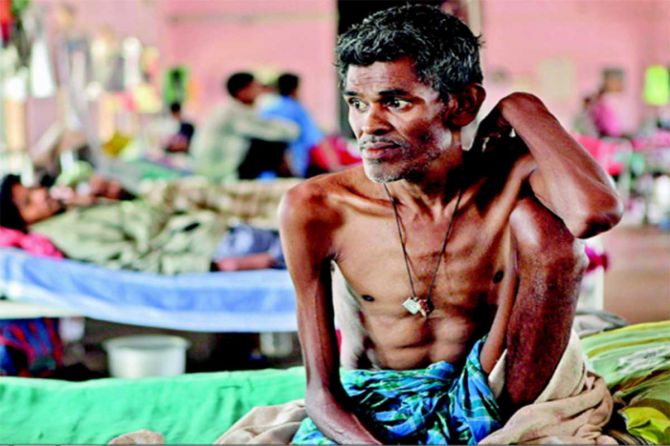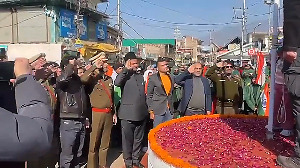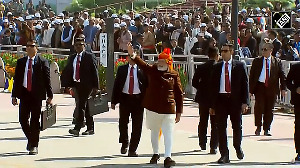'Working in collaboration is beneficial and more rewarding in the long run.'
'Competition may bring personal glory, but is very short lasting.'
'Work with people who are interested in working with you instead of competing with you.'

Dr Subash Babu -- Scientific Director, International Centre for Excellence in Research-India Program at ICMR-NIRT in Chennai -- became the first Indian to win the prestigious 2022 Bailey K Ashford Medal in its 82-year-old history.
In addition to the Bailey K Ashford award, Dr Babu was also awarded the 2022 Fellow of the American Society of Tropical Medicine and Hygiene Award for his exemplary research work and contribution in tropical medicine for almost three decades.
"Finding the right mentor is the single most important difference in your research career. I was fortunate to have good mentorship... I am very happy to mentor. Welcome to reach out to us if you are interested in science and research! My door is always open!", Dr Babu tells Rediff.com's Shobha Warrier.

You are the first Indian scientist to win the prestigious Bailey K Ashford award. Was it unexpected?
It was not unexpected because two of my mentors have already won the award. Perhaps I was following their paths.
But I felt truly honoured as ASTMH, which is the pre-eminent society in tropical medicine, felt I was eligible for this.
It was a great honour for a scientist.
How important is it for scientists to get awards and recognition? Does it help your work in any way?
It is definitely very important as it gives you greater impetus, encouragement and enthusiasm to continue the work you are doing. This is just like a Lifetime achievement award.
We are in the field of public health, and work both in India and abroad. So, this award is very important as it is a milestone in my scientific career.
It encourages us as well as our colleagues to work harder in the future.
There has been interest from investigators globally in collaborating with us in India, knowing that we are capable of producing world class research.

Your major work is in fighting TB. It is said that 40% India's population carry the TB bacteria. Why is it that it is more prevalent in India and other poor and developing countries? Is there a connection between economic development and prevalence of infectious diseases like TB?
Definitely, there is a connection. A lot of it is due to socio-economic issues.
TB is an air-borne disease, and it is spread when someone coughs and you are exposed to it.
In India, we are constantly exposed to a variety of air borne diseases because of the dense population and people living in small, crowded, unsanitary and unhygienic conditions.
One of the other major factors is, under-nutrition which is very common in India.
We also have a very high prevalence of diabetes. Smoking and alcoholism also are contributing factors.

Is economic condition a major factor?
Yes, the number one contributing factor is under-nutrition. We have been investigating this for more than a decade.
We are trying to see how we can prevent TB by providing nutritional supplementation.
The bacteria which causes tuberculosis is called Mycobacterium tuberculosis.
Although 40% of us are exposed and have the bacteria (which causes tuberculosis) in our body, all of those who have the bacteria don't get the disease; only a smaller percentage get the disease.
Those who have immunity against the bacteria do not get the disease.
That is why our main goal is to see whether we can enhance immunity and prevent people from developing the disease.
We are looking at ways in which we can modulate the immune system especially in the high-risk people like those who have under-nutrition, diabetes, HIV, smokers, etc.
Because the economic condition of the family contributes majorly in the prevalence of TB, do you have to start building immunity at a very early age itself?
Yes. Poverty definitely increases the risk, and children are at the highest risk in developing active disease. So, we need to have better tools to address the problem.
Though the socio-economic condition plays a major role, we cannot depend on socio economic development alone to fight the disease as it will be multifactorial.
So, we scientists are developing tools instead of relying on the betterment of socio-economic conditions alone.
Can you elaborate on what those scientific tools are?
We can come up with better diagnostic tools to identify children who have the infection and are at high risk for developing disease.
If we can identify them early, we can treat them early and thus prevent the infection from becoming TB disease and also prevent the spread to others.
Secondly, at the community level, if we can identify the high-risk people who can go from TB infection to TB disease, we don't have to treat all the 40% of the population. We are actively working on this.
If we can do that, we don't have to give preventive therapy to all the 40%, we need to look at only say, 5% of the population which is easier to do.
These are the tools we are coming up with.

What does India have to do to eliminate a disease like TB? What should people, administration and scientists do?
At the population level, more awareness for the individual is very important. That is, people have to educate themselves about TB, seek treatment as soon as they see the symptoms and also be compliant with completing the treatment.
This is what the common man can do in moving forward.
The government, of course, can implement the diagnostic tools at the grassroot level.
Yes, we as scientists have a very important role to play, not just with the tools.
Right now, the treatment of TB is long; six months. So, it is very hard for people to stick to so many different tablets for six months.
We are working on coming up with shorter regimens as it would help people in completing the treatment.
It was reported that in India, the highest number of TB patients are in Delhi. Is there a connection between air pollution and prevalence of TB?
Quite a few studies have looked at air pollution and the prevalence of TB but they have found that more than outdoor air pollution, it is the indoor pollution that is a contributing factor.
Regarding Delhi, air pollution is definitely a contributing factor.
Anything that affects the lung, anything that weakens the immunity of the person can make him/her susceptible to TB.
But that alone is not the factor. Mumbai has a very high prevalence of drug resistant TB. That's because of overcrowding in the city and in the slums of Mumbai.
Yes, there are multiple factors that contribute to TB, and air pollution is just one.
At the award function, the president of ASTMH spoke highly about your work on the influence of Type 2 diabetes on TB in response to the anti-TB therapy. Will you please explain the connection between Type 2 diabetes and anti-TB therapy?
As you know, Type 2 diabetes is becoming very prevalent in India. India is soon going to be the diabetic capital of the world. India is number one in TB also. So, it is going to be a dual problem for India.
Diabetes affects TB in multiple ways. Diabetes is a risk factor for developing active TB from TB infection.
When you have diabetes, the severity of TB is much higher compared to those who don't have diabetes.
Those who have diabetes may still have the disease even after six months of treatment. And those who get cured after six months of treatment, can get re-infected too.
TB patients with co-morbidities are much more prone to mortality.
In short, those who have diabetes have higher risk of failure of treatment, recurrence of TB and death due to TB.
So, if you have diabetes, you need to monitor TB more carefully. In fact, we need to monitor you even after the treatment is over.
One of our contributions is in trying to understand the immunological mechanism by which diabetes affects the response to TB, like how immunity comes down and how we can boost the immunity.
For example, one simple thing we have found is, the common drug used to treat diabetes- metformin- actually helps in combating TB.

Your work in the field of helminth infections also was lauded at the award ceremony. WHO estimates that around 240 million children in India are at risk of parasitic intestinal worm infection. Is it again, due to the socio-economic conditions... poverty?
Definitely. We did a lot of screening, and found very high rates of a soil transmitted intestinal infection called hookworm in children, especially those children who live in impoverished conditions.
Again, another major reason is overcrowding.
A lot of these infections are transmitted through fecal-oral routes, where there is no proper toilet hygiene, where there are no toilets at home, and where there is defecation in the open. These things contribute a lot.
These infections are very bad for children as they cause stunted growth, anemia, cognitive impairment and affect not just physical but mental development too.
We call these endemic diseases of poverty. They require a bigger holistic approach.
Is it a long way to go for India in fighting these infectious diseases?
Yes, a very long way to go. But we are taking great strides.
The National TB elimination programme is working hard to identify and eliminate TB in a few years.
Is it possible?
Realistically, it is going to take some time. India contributes about 27% of the global TB burden.
Yes, it is not an easy task to get rid of it quickly. But this gives us an impetus to work hard towards the goal.
Any words of advice for scientists who aspire to make a difference?
My success is because of my team, and staff over the years, of my peers who have collaborated, mentors who have shown the way, and administrators who have helped the workflow.
Science is a team sport. Working in collaboration is beneficial and more rewarding in the long run.
On the other hand, competition may bring personal glory, but is very short lasting. Work with people who are interested in working with you instead of competing with you.
Finding the right mentor is the single most important difference in your research career. I was fortunate to have good mentorship.
Will you mentor?
I am very happy to mentor.
Welcome to reach out to us if you are interested in science and research! My door is always open!
*Kindly note the images have been posted only for representational purposes.
Feature Presentation: Ashish Narsale/Rediff.com











 © 2025
© 2025